
James William Gibson (21 October 1877 – September 1951) was a British businessman who was the owner of the English football club Manchester United from December 1931 until his death in September 1951.

James William Gibson (21 October 1877 – September 1951) was a British businessman who was the owner of the English football club Manchester United from December 1931 until his death in September 1951.
The son of a successful uniform manufacturer, Gibson was born in Salford but brought up in central Manchester with his younger brother, John, and their sister, Florence, who died at a very early age. Tragedy befell the family again when Gibson was 14, as both his parents contracted fatal illnesses and the children went to live with their paternal grandparents. The grandparents died soon after, and the children were taken in by their uncle, their mother's only brother, William Fell. Fell was himself a successful businessman, like the boys' father, and had become a famous corn merchant on the outskirts of the city. Gibson began working with Fell in the corn business, immersing himself in all aspects of the company, but excelling in sales.
Just after the start of the 20th century, after 15 years working for his uncle, Gibson decided to set up his own company. The textiles industry in and around Manchester was booming at the time, so Gibson followed his father into the uniform business, and since his father's name was still fairly well known in the city, he quickly built up a portfolio of contacts. The business grew steadily for several years, before the outbreak of the First World War earned Gibson his first major contract; the company began manufacturing uniforms for the British Armed Forces on a daily basis. This deal forged Gibson's reputation and by the end of the war he had become a well-respected entrepreneur.
However, the end of the war also meant that the company was now selling less uniforms and needed a new source of revenue. Not content with anything small-scale, Gibson approached the city corporations with an offer to provide uniforms for the tram drivers and conductors, selling the idea that they would be proud to wear such a uniform. The idea proved a success, and Gibson was able to diversify into other fields outside clothing. Nevertheless, he continued to concentrate on the uniform business and, in 1924, he entered into a partnership with Messrs F. Jones and R. H. H. Briggs, forming Briggs, Jones and Gibson. They relocated the business to larger premises on Lostock Street, near Oldham Road in Collyhurst, and the combined talents of the three men meant further expansion, both in Manchester and in other cities. However, in 1926, Jones died, putting the business under pressure. For reasons thought to be related to his age, Briggs also decided to sell his share in the business, and Gibson took sole control of the company. This coincided with the onset of the Great Depression, which meant a massive downturn in trade. Gibson's interests in other fields meant that the business was able to survive the Depression.
A Salfordian by birth, Gibson was living in the Old Trafford by 1911 and was aware of his 'local' football team, who had just moved into their new stadium in the district, although whether he was an active supporter at this time is not known.
Unlike the wealthy Gibson, Manchester United F.C. was being affected greatly by the Great Depression around the start of the 1930s. Their previous owner, John Henry Davies had died in 1927 after 25 years at the club. They had won the FA Cup and two league titles during the first 10 years of his chairmanship, but were less successful during the 1920s, enduring a spell in the Second Division, and were thousands of pounds in debt. In 1931, just before Gibson took over, United were relegated to the Second Division again.
Gibson injected around £40,000 more funds into the team during the Great Depression, and after five seasons in the Second Division, they were promoted as champions. Despite being relegated straight back from the First Division, they returned at the first attempt.
When Old Trafford was wrecked by German air raids on 11 March 1941, he also funded the rebuilding of the stadium, which was completed in 1949, and started the United Youth Academy that produced the great Busby Babes side of the mid-to-late 1950s. He also oversaw the arrival of players including Johnny Carey and Jack Rowley, who played a crucial part in the club’s successes of the late 1940s and early 1950s.
At the end of the Second World War, he appointed Matt Busby as manager, but only lived to see Busby guide the club to one major trophy – the 1948 FA Cup – as he died in 1951, a year before they won their first top division title since 1911. He did not live to see the revolution of the Busby Babes later in the decade.

Manchester United Football Club, commonly referred to as Man United, or simply United, is a professional football club based in Old Trafford, Greater Manchester, England. The club competes in the Premier League, the top division in the English football league system. Nicknamed the Red Devils, they were founded as Newton Heath LYR Football Club in 1878, but changed their name to Manchester United in 1902. After a spell playing in Clayton, Manchester, the club moved to their current stadium, Old Trafford, in 1910.

The Munich air disaster occurred on 6 February 1958 when British European Airways Flight 609 crashed on its third attempt to take off from a slush-covered runway at Munich-Riem Airport in Munich, West Germany. The aircraft was carrying the Manchester United football team, nicknamed the "Busby Babes", along with supporters and journalists. There were 44 people on board, 20 of whom died at the scene. The injured, some unconscious, were taken to Munich's Rechts der Isar Hospital, where three more died, resulting in 23 fatalities with 21 survivors.

Sir Alexander Matthew Busby was a Scottish football player and manager, who managed Manchester United between 1945 and 1969 and again for the second half of the 1970–71 season. He was the first manager of an English team to win the European Cup and is widely regarded as one of the greatest managers of all time.

Roger William Byrne was an English footballer and captain of Manchester United. He died at the age of 28 in the Munich air disaster. He was one of the eight Manchester United players who lost their lives in the disaster on 6 February 1958. He made 33 appearances for the England national team.
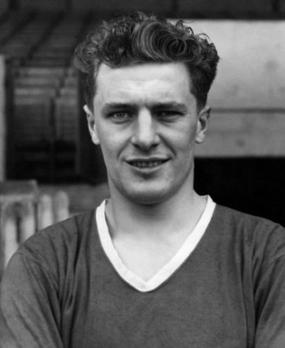
Geoffrey Bent was an English footballer who played as a full-back for Manchester United from 1948 until 1958. He was one of the Busby Babes, the young team formed under manager Matt Busby in the mid-1950s. Bent only made twelve first-team appearances for Manchester United, who already had an international-quality left-back in Roger Byrne. Modern writers speculate that at most other teams Bent would have been a regular starter, and he was the subject of interest from fellow First Division clubs, but Busby refused to let him leave. He was one of eight Manchester United players who died in the Munich air disaster, when their aircraft crashed on its third attempt to take off from a slush-covered runway at Munich-Riem Airport after a European Cup match in Belgrade.

James Patrick Murphy was a Welsh footballer who made over 200 appearances for West Bromwich Albion and won 15 caps for the Wales national team, which he later managed. Murphy is most famous for being an influential figure at Manchester United from 1946 until the 1970s, as assistant manager, first-team coach, reserve team manager and a full-time scout, although he disliked the limelight and preferred to work quietly behind the scenes.

William Anthony Foulkes was an English footballer who played for Manchester United in the Busby Babes teams of the 1950s, and also in the 1960s. His favoured position was centre-half. For Manchester United, he played 688 games which places him at number 4 on the all-time list of appearances behind Ryan Giggs, Bobby Charlton and Paul Scholes. He made 3 appearances as a substitute. He also started in every single United game in the 1957–58, 1959–60 and 1964–65 seasons. He scored a total of 9 goals in his 18 seasons at United and helped the club win four First Division titles, one FA Cup and one European Cup. He was capped only once for England in 1955.
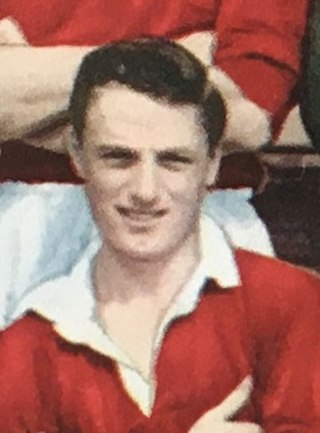
Albert Joseph Scanlon was an English footballer. He began his career with Manchester United and was one of the "Busby Babes" who survived the Munich air disaster of 1958. Although he sustained severe injuries, he recovered and continued to play league football for Newcastle United, Lincoln City and Mansfield Town. He then went on to play non-league football until his retirement.

John Blanchflower was a Northern Irish footballer. He graduated from Manchester United's youth system and played for the club on 117 occasions, winning one league title, before his career was cut short due to injuries sustained in the Munich air disaster. He was also capped 12 times at senior level by Northern Ireland.
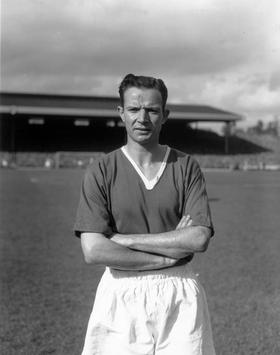
Reginald John Berry, also listed as John James Berry, was an English footballer. Berry joined Manchester United from Birmingham City in 1951. Despite his diminutive stature, he was a natural right winger with technique and pace. One of the Busby Babes, the February 1958 Munich air disaster brought his career to an end.

The "Busby Babes" were the group of footballers, recruited and trained by Manchester United F.C. chief scout Joe Armstrong and assistant manager Jimmy Murphy, who progressed from the club's youth team into the first team under the management of the eponymous Matt Busby from the late 1940s and throughout the 1950s. The squad most associated with the name "babes" was that of the 1957–58 season, many of whom died in the Munich air disaster, and who, with an average age of 22, had been touted to dominate European football for the next few years.
Manchester United Football Club was formed in 1878 as Newton Heath LYR Football Club by the Carriage and Wagon department of the Lancashire and Yorkshire Railway depot at Newton Heath. The team initially played games against other departments and rail companies at their home ground at North Road, but by 1888 the club had become a founding member of The Combination, a regional football league. However, following the league's dissolution before the end of its first season, Newton Heath joined the newly formed Football Alliance, which ran for three seasons before being merged with The Football League. This resulted in the club starting the 1892–93 season in the First Division, by which time it had become independent of the rail company, dropped the "LYR" from its name and moved to a new ground at Bank Street. After just two seasons, the club was relegated to the Second Division.
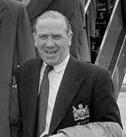
Manchester United Football Club is an English professional football club, based in Old Trafford, Greater Manchester, that plays in the Premier League. Founded as Newton Heath LYR Football Club in 1878, they changed their name to Manchester United in 1902.
Manchester United Football Club is an English football club based in Old Trafford, Greater Manchester. The club was formed as Newton Heath LYR Football Club, the works team of the Lancashire and Yorkshire Railway depot in Newton Heath, in 1878. The club split from the railway company in 1892 and remained under private ownership for almost 100 years, changing its name to Manchester United after being saved from bankruptcy in 1902. The club was the subject of takeover bids from media tycoon Robert Maxwell in 1984 and property trader Michael Knighton in 1989, before going public in 1991; they received another takeover bid from Rupert Murdoch's BSkyB corporation in 1998 before Malcolm Glazer's stake was announced in September 2003.
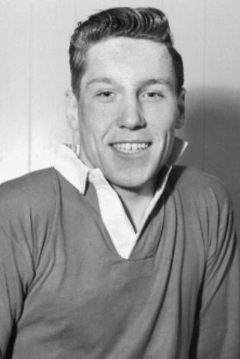
Edward Lewis was an English footballer who played as a centre-forward and later as a full-back. Born in Manchester, he played for Goslings before joining the now-famous Manchester United Junior Athletic Club (MUJAC). He made his debut for Manchester United in 1952, but struggled to nail down a regular place in the starting XI and was sold to Preston North End in 1955.
John Peter Doherty was an English footballer. His regular position was at inside right.

Fergie's Fledglings were a group of football players recruited by Manchester United under the management of Sir Alex Ferguson and trained by assistant coaches Brian Kidd and Eric Harrison, before eventually progressing to the first team during the 1990s.
Louis Rocca was an English football administrator and scout who played a pivotal role in the development of Manchester United F.C. He had several roles within the club from the 1890s to the 1940s, most notably putting them in contact with Matt Busby in 1945; Busby would go on to manage the club for 25 years.

Stretford High School is an 11-16 non-selective secondary school in the borough of Trafford, Manchester. The school has working partnerships with both Manchester City and Lancashire County Cricket Club.

United is a British television film directed by James Strong and written by Chris Chibnall. It is based on the true story of Manchester United's "Busby Babes" and the aftermath of the 1958 Munich air disaster, with the film's events taking place between August 1956 and May 1958. In particular, the film focuses on the experiences of assistant manager Jimmy Murphy, played by David Tennant, and Bobby Charlton, played by Jack O'Connell.